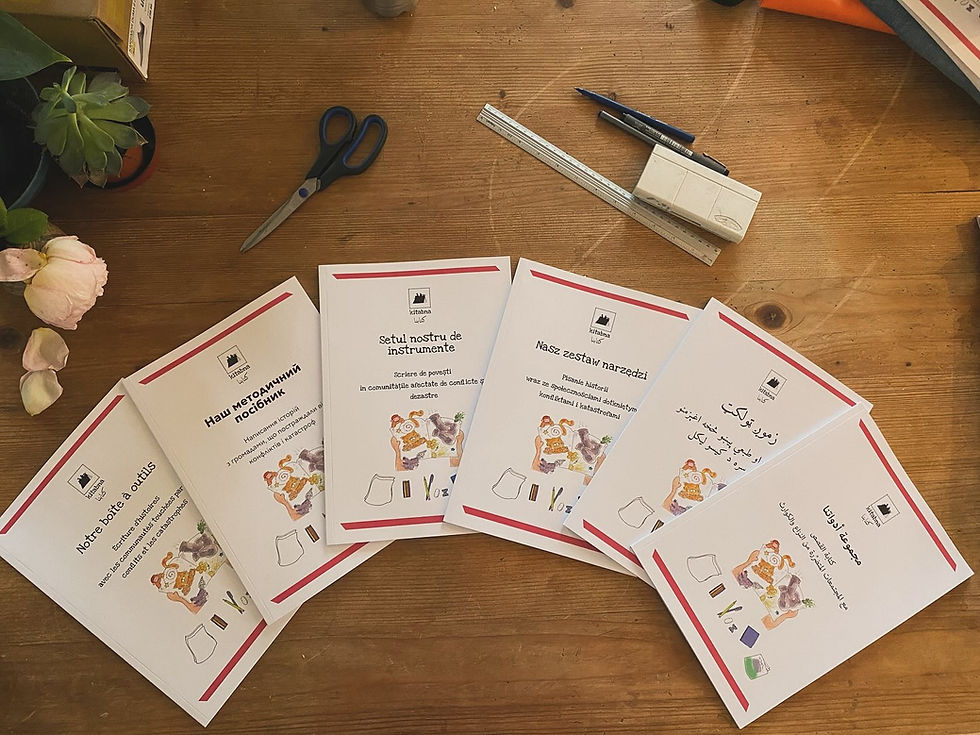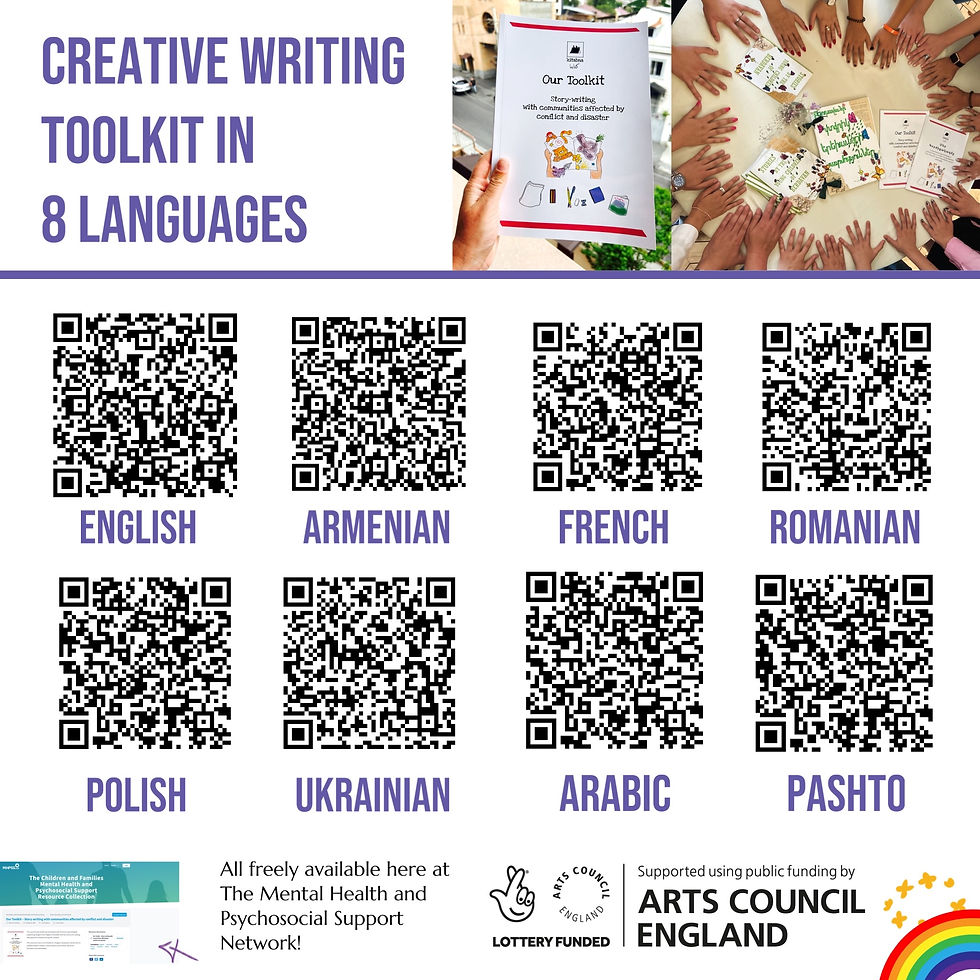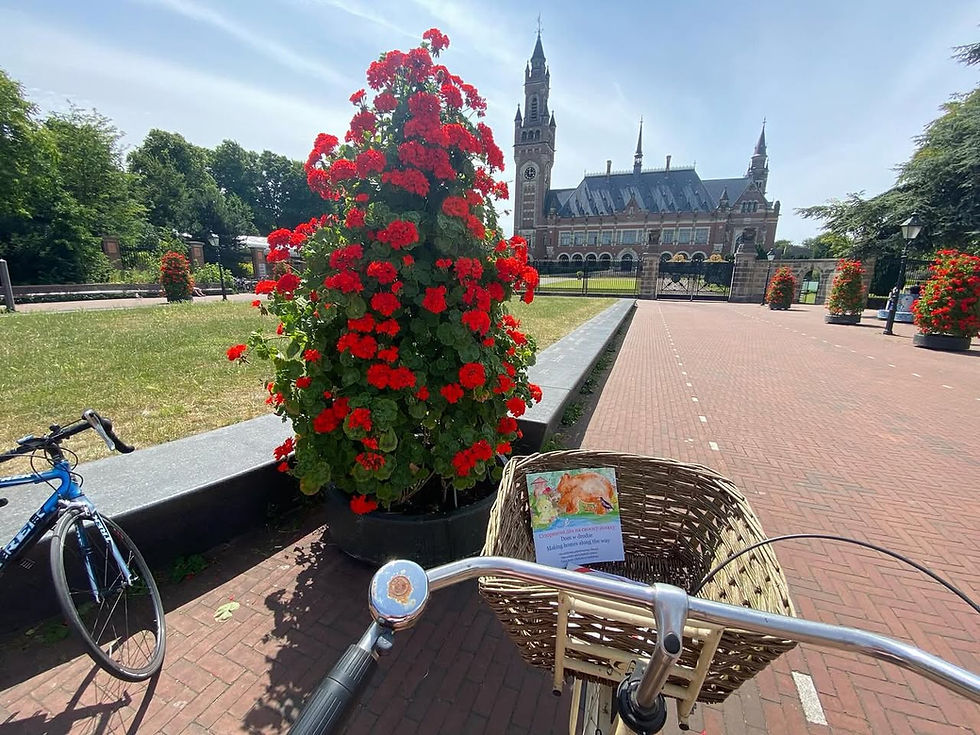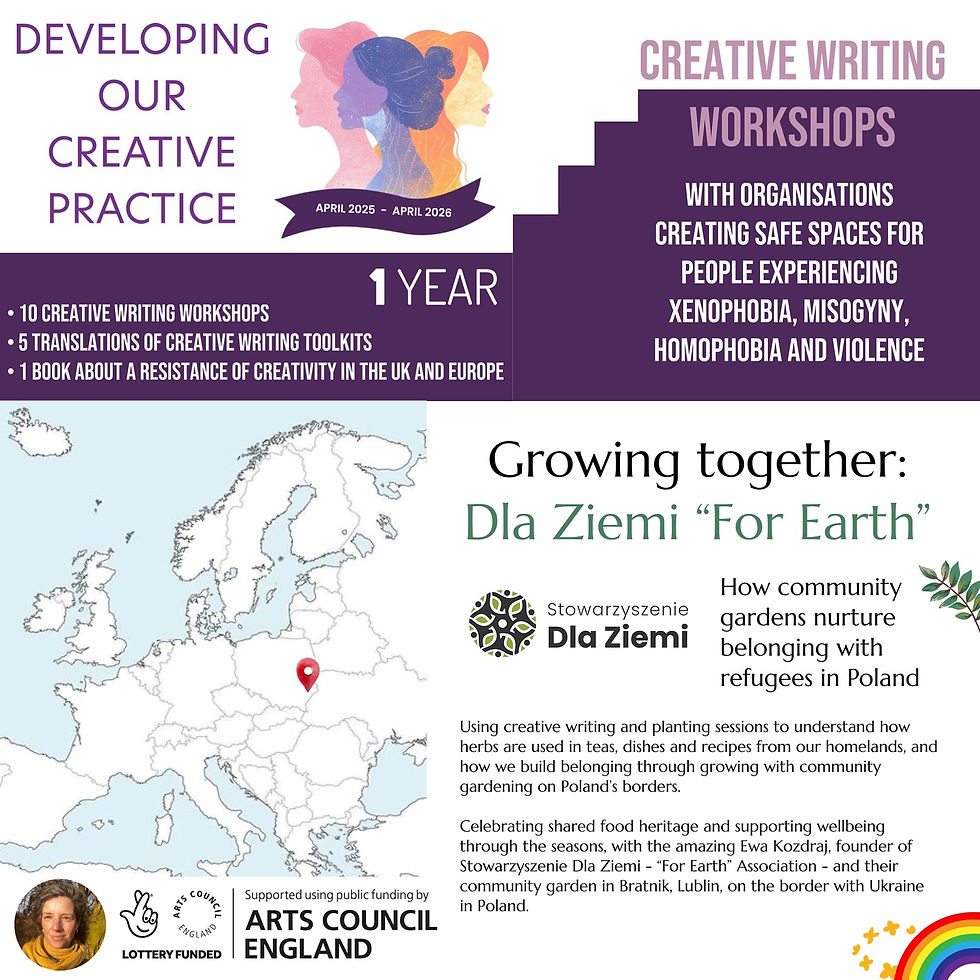Arts Council England: standing with you
- Helen Patuck
- Jul 21, 2025
- 11 min read
A big part of creative writing is finding the courage to follow a thread. The thread of a conversation, a situation unfolding, a relationship developing – a story that has never been told before. In 2025, I am following the thread of a writing dream come true: a grant from Arts Council England which allows me to develop my practice over one year, and stand exactly where I want to stand. In care, solidarity and creative peacebuilding,

It’s surprising how much can change in six months. The last entry to my consultancy blog in January followed the thread of some new opportunities: mentoring a friend, novelist Han Smith; starting out as a community ESOL teacher for refugee and newcomer women in my little corner of England; illustrating an emotions and language card series with a research team in Northern Ireland; finalising our 2025 My Hero is You with WHO and UNICEF.
Taking care of each other when mpox is here is now available in English, French, Kirundi and Kiswahili. As crises face our world, further translations have been made of our My Hero is You made for children affected by conflict, Supporting each other when wars come, is available now in English, Arabic, French, Hebrew, Ukrainian, and Kiswahili.
For children affected by the Myanmar earthquake, My Hero is You Too is a beautiful local adaptation of our story.

An unexpected thread in my life this year was recieving a Developing Your Creative Practice grant from Arts Council England in March. I was so touched when Han asked me to mentor her in community creative writing last December, as part of her own Developing Your Creative Practice grant – not least of all because her debut novel, Portraits at the Palace of Creativity and Wrecking was voted one of The Guardian's best books of 2024.
With that same faith, last winter Han encouraged me to apply for my own grant. She told me how you could use it for anything: research for a novel, literary translation, professional development, whatever could help you most as an artist.
As an artist working across discliplines – writing, illustrating, consulting, teaching – it felt quite intuitive for me to choose. In a time when civil society faces funding cuts and limits to its power – both financially, and spiritually, given the scale of crises we face at local and global levels – I wanted to develop my capacity to build creative capacity in others.
Teaching creativity as resistance to destruction
So much that is lost can never be recovered. Creating new things, and sharing hope, as a practice, is something I choose to do, both in the UK and where I have relationships in neighbouring Europe. I plan to introduce my participants to the rainbow spectrum of beauty that creativity has revealed to me in my years of humanitarian practice so far:
the co-creation of inter-cultural spaces of connection
the co-creation of books and stories that showcase the hopes and dreams of vulnerable people
participatory approaches to grassroots rights advocacy
After years of technical teams taking a chance on me as a creative, and creative methods, I am returning the gaze to say: I know funding is being cut across our sector and across the world. How can we make something beautiful together?
A toolkit of best practices
The first step and permissable expenditure of my grant was to translate Kitabna's story-writing toolkit into five new languages, all available here.


Following the thread: 10 workshops for newcomers to creative writing
The organisations I selected are a blend of connections I have established over a decade of working in the humanitarian and human rights sector, largely overseas, and new local connections in the UK, facilitating work that addresses key injustices – xenophobia, homophobia, misogyny, violence – in a particularly innovative way.

The following workshops are already underway
"All Our Wild Roots: Creating a Herb Garden with refugee and newcomer women in Somerset, UK"
June 2025
Outcomes: two workshops and a recipe book
The workshop series kicked off right in my backyard: almost literally, in my local community garden, Wild Roots, which is part of the Wilder Woods Central Somerset Outdoor Learning Partnership.
In spring 2025, my friend and community garden coordinator, Ursula Casey, and I put our heads together to bring two great passions into our Wild Roots community garden:
women gathering around planting for wellbeing
creating spaces where ESOL learners and newcomers to the UK can meet, relax and encounter easygoing conversations around shared pleasures.

We made a simple plan: to invite refugee and newcomer women locally to create their own Herb Garden with us, through ESOL teaching networks and spaces of care. One of our regular volunteers, Merry, donated the raised beds, and we created a two-workhop plan. Ursula would teach the creation of the bed and Helen would create some moments for oral storytelling about the herbs we were planting.
So, in our first workshop we would plant, and in our second workshop, we would cook with our herbs.
On the first session, women travelled from remarkably far away to be with us. Not only had they been born in countries far away – Mexico, Pakistan, Turkey, Palestine, Spain, Kurdistan, Ukraine and Korea – but just as impressively, they had travelled from far within our own county. Women had come from Cheddar, Wells, Taunton, Shepton-Mallet, Glastonbury and Yeovil, all to be there with us, taking trains, buses and carpooling over the hills.
We did our best to share local bus routes, signposting to the 667 bus, which runs between Street and Wincanton, and stops just outside the garden. We introduced our garden as people arrived, sharing small pleasures such as the scent of lemonbalm, the crunch of freshly podded broad beans, and the magic of fresh cammomile. When the time was right, we gathered to drink fresh herbal infusions, such as mint, and also fresh coffee Ursula had prepared – sharing some small cakes and snacks people had brought along.
In a circle, we shared a bit about who we were, discovering we were forest-fire fighters from Spain, musicians from Mexico, Arabic teachers from Palestine, beauticians from Kurdistan, dentists and designers from Ukraine, nurses from Korean, and of course, ESOL tutors and gardeners from Somerset.
When it came to planting our bed, it was an intuitive process whereby some women added compost to the raised bed, mixing with gravel for the best drainage, and some people potted up herbs for the bed and for everyone to take home. We planted basil, dill, oregano, parsley, coriander, thyme and purslane.

Our story is available to read here All Our Wild Roots Recipe Book.
Between sessions, Ursula shared herb cuttings with everyone to take home and see if roots formed. We formed a group chat and stayed in touch about root growth and plants on windowsills.
In the second session, we welcomed a mixture of participants from the first workshop, and new participants, from Germany and Hampshire. This time, we eased into the day with coffee and a delicious homemade Ukrainian lemon cake. We organically seperated into a team of painters – who would paint the names of our herbs in all our different languages – and cooks – who would start to prepare the most amazing dishes for lunch. A chopping team set to work cutting onions, tomatoes, herbs and cucumbers for salads; a fire-stove cooking team set aubergines to grill and potatoes to boil; a flatbread team rolled several flatbreads, infusing them with thyme, and turning them, in some cases into aloo paratha - stuffed with onion and potato.
When the time came for painters and cooks to sit down and eat, we had the most delicious feast together. In the pages of this book, you will read about how we planted herbs in our garden, in our dishes, and in our memories. We hope to see everyone at regular sessions soon, or at least, sharing our recipes with their loved ones.
I am so pleased to say we have already been invited as a group to share our workshop experiences and recipe book in North Somerset in November 2025, with ESOL practitioners supporting refugee communities with green spaces.
"Save the Children: Creating roundtables for MHPSS with youth in the Hague"
July 2025
Outcomes: workshops, and online development of a card game
From very local to a boat across the water: my next workshop was held in the Hague with Save the Children Netherlands, where a colleague had connected me to the warm and enthusiastic MHPSS team. As soon as I met Relinde Reiffers and her collegues, we loved the idea of working together.
I took the ferry from Harwich to the Hoek van Holland, sailing over blue seas. As my grant is limited to a small travel stipend per workshop, I saved money on accommodation by offering my child-minding and dog-walking services to a local family living not far from the Peace Palace. I did this through the cultural exchange programme, Workaway. This gave me the chance to not only live in the centre of the Hague, but learn more about a city that has, for a long time, hosted roundtable discussions relating to peace – a key theme of our planned workshop.

I have wanted to visit the Hague ever since I discovered the 1915 Women's Congress at the Hague, in the Gender, Peace and International Law modules of my MSc at SOAS University of London. As a masters student, pacifist, feminist and peacebuilder, I was fascinated by this founding meeting of the Women's International League for Peace and Freedom, where women from all over Europe and the USA travelled during wartime to discuss peaceful resolutions and end sexual violence during conflict. In many cases, they did not yet have the right to vote in their countries.


2025, with bike and books
The Peace Palace permanent exhibition celebrates as it's first artefact works of art that gently challenge war and all its destruction. “Lay Down Your Arms!, a novel by the Austrian baroness Bertha von Suttner, was published in 1889 and considered a “disarmament-bestseller”. Bertha played a central role in the organised peace movement, and as a friend of both Alfred Nobel and Andrew Carnegie, we might thank her is some ways for the creation of the Nobel Peace Prize.
Art and peace
This celebration of literature as a force for peace was fascinating to discover given I had brought along to my workshops with Save the Children Netherlands the children's books I had co-created with Ukrainian teeangers and children in Pomerainia, northern Poland, with Save the Children Poland country office. At home with my host family, I also eerily discovered the Dutch cousins of the little dogs from their stories, Bantyk and Fantyk.
“Their home in the forest” was the first story we witnessed children writing as a group, back in November 2023, in those snowy days in Pomeranial, northern Poland. All of those co-created books are available on the Kitabna website, and in the Save the Children resource centre: Tales from Ukrainian children.
As trilingual books, English-Polish-Ukrainian, I have been reading these stories with my Ukrainian ESOL students in England this year, sharing them in all kinds of advocacy, and also carry them wherever I go. Their art, over one hundred years later, carries similar messages of peace to the Hague: of two beautiful dogs building a new home in the forest after losing theirs.


Our workshop in the Hague brought youth from Save the Children’s youth ambassador programme and wider domestic and international networks into dialogue with MHPSS experts. We came together after months of discussion for a truly participatory workshop, with the mission of co-creating a card game that facilitates conversations around dilemmas linked to conflict and climate-affected communities. Our game aims to share tools and models of respectful discussion to build psychosocial interventions that feel inclusive.
In this hybrid space, we hosted participants from the Netherlands, Syria, Palestine, Italy and diasporas, blending years of experience with newcomers to topics and challenges. We used small group work and split into teams to develop concepts around a card game framework.
Cards for dilemmas, and how to face them, together
By the end of the day together we had developed a series of cards reflecting characters, dilemmas, tools, values, reflection, places of sanctuary and signposting to emotional safety. Our plan is to co-create the game using online tools, such as Canva, developing our ideas on designs we build together.

This part of the co-creation process is facilitated through an open studio approach, whereby as an artist I share my workspace online and onboard my participants to design tools they may not have encountered before. By sharing the process, I hope to encourage capacity-building in teams, giving the people I work with the skills to develop their own creative resources in the future.

Notes from my participants about the cards they would like us to create
“Who I am in English, and in my language too”: creative writing for ESOL students and practitioners in south-west England
July 2025
Outcomes: workshops and co-creation of a ESOL board game
Lorna Rossi was one of the first people I hoped to work with when I applied for my Developing Your Creative Practice grant. As the ESOL coordinator for South West Councils, Lorna supports councils, teachers, colleges and community projects with their education work across the seven counties of south-west England: Somerset, Cornwall, Devon, Dorset, Wiltshire, Gloucestershire and Bristol.
This includes my own home county of England, Somerset, where I am something of a newcomer to ESOL teaching, having only started with my own Conversation Groups this January. Lorna has been something of a mentor and champion, as someone committed to innovation that supports people in their English language learning journeys.

With the help of Lorna and Sara Oldroyd at Gloucestershire Council, we arranged to meet teachers and practitioners of ESOL at the Gloucester Adult Learning Centre for an afternoon of sharing skills and ideas for innovation around the integration of ESOL learners into our communities. We worked through creative writing prompts we can share with our students, to learn more about the challenges they face learning ESOL in our communities.
From Ukraine, India, Gloucestershire and the wilds of Somerset, we were ESOL teachers, social work practitioners, students and health advocates today. Between us we spoke: English, Ukrainian, Russian, German, French, Spanish, Polish, Gujrati, Mizo, Hindi, Arabic, Urdu and Italian. We came together to share passion, care, experience and some incredible concepts for our co-created ESOL game.



Participants finally came up with a board game designed to help newcomer, refugee and asylum-seeking ESOL students and communities navigate our towns and cities in the UK. “We’re Going Places”: our game will signpost to public services, education, work opportunities and social spaces whilst encouraging friendships with local people and opportunities to practice English.

Focus groups and brainstorming
Using Gloucester city as an example, and working in pairs and small groups, we shared so many beautiful ideas and will continue to develop our resources all together, as a team, in an open studio, for piloting with South West Councils and south-west England over 2025-26.
Upcoming workshops in the days, weeks and months ahead...
“All these wild seeds”: Creative writing workshops in Bucharest with the Romanian Council for Refugees, supporting refugees since 1998, and The Legacy, a co-working space committed to restorative kindness and home to community gardens and national seed bank
July 2025


"Finding the earth beneath us and between us": Creative writing workshops in the Lublin region of Poland with Dla Ziemi (“For Earth” Association), supporting refugees to Poland since the 1990s
August 2025

“Women for Women International: Creating a Change Agent Handbook”: Creative writing prompts for grassroots women's rights advocacy with UK, DRC, Nigeria, South Sudan and Iraq country offices
August 2025

“Letters from the land, letters to the sea”: Creative writing workshops in Plymouth for Reclaim the Sea, supporting refugee and newcomers to the UK with outdoor water sports and grounding social spaces
September 2025

“Visualising queer spaces and utopias”: A creative writing workshop for newcomers to the Queer Britain national LGBTQ+ museum, exploring memory, hope and inner strength
October 2025

« Traduire le même, l'autre et le soi » creative writing workshops with translators supporting refugees in France, understanding what gets lost and found in translation
November 2025

Also in planning or conversation are workshops with The Dr Denis Mukwege Foundation in the Netherlands, the International Commmittee of the Red Cross in Switzerland, the Dilemma Mobile Academy.



Comments